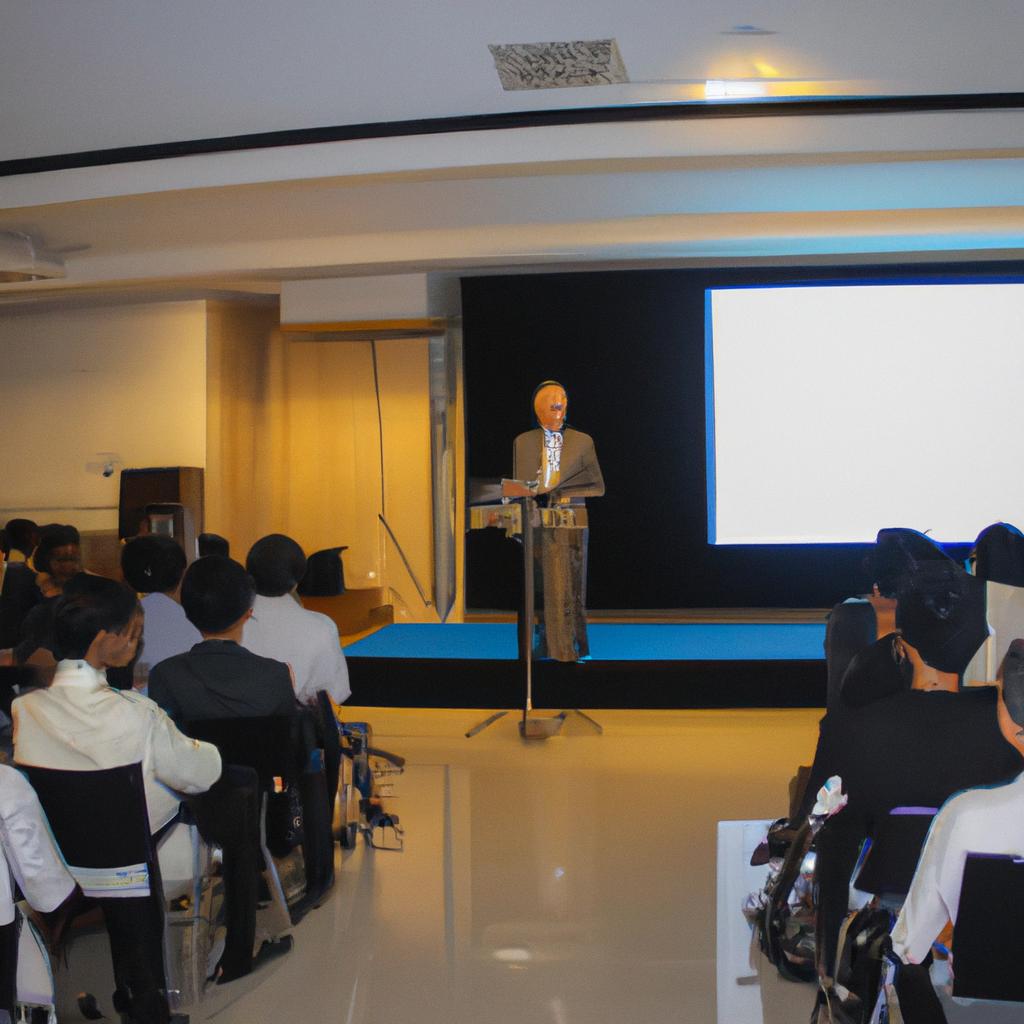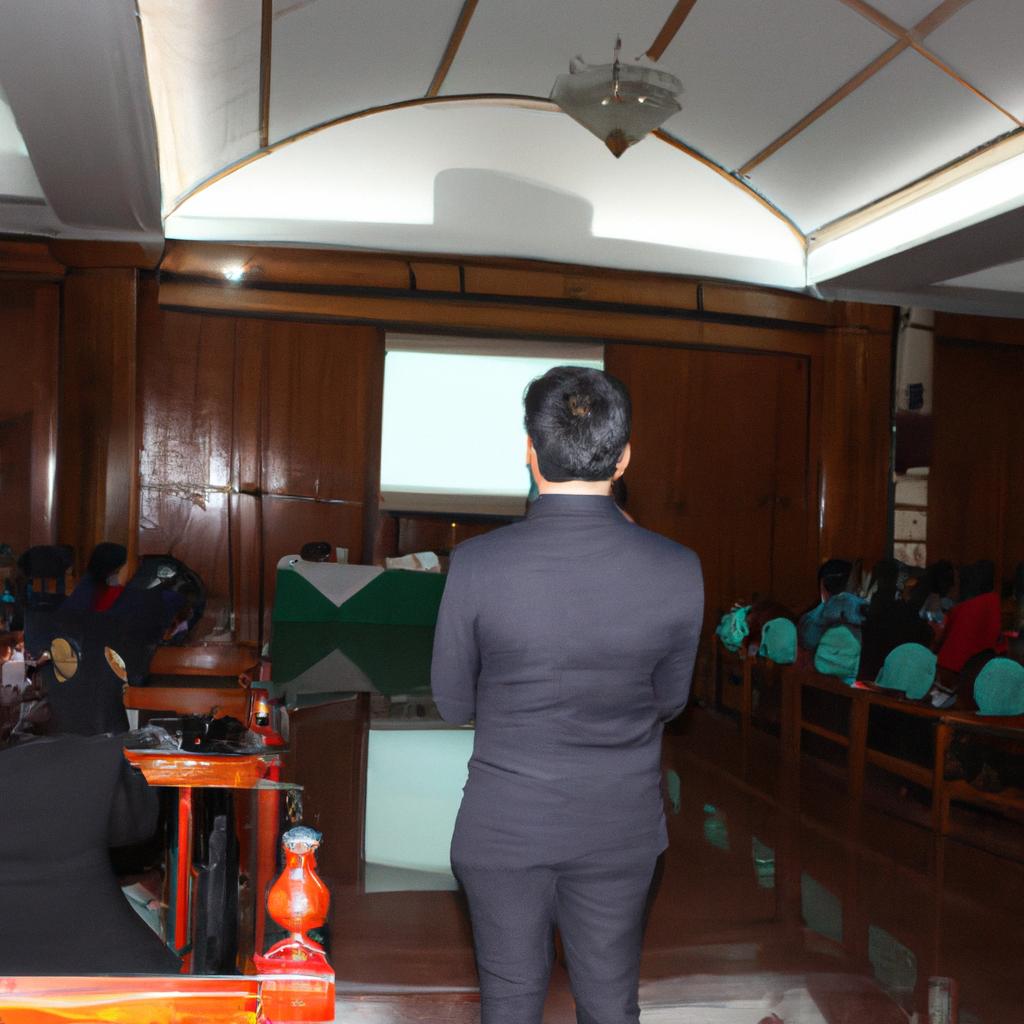Political action committees (PACs) play a significant role in the financing of political parties, allowing for the mobilization of financial resources to support various campaign activities. In the state of Pennsylvania, the Reform Party has emerged as a prominent force seeking change and advocating for political reform. This article aims to explore the utilization of PACs within the Pennsylvania Reform Party and their impact on party finance.
As an illustrative example, let us consider a hypothetical scenario where the Pennsylvania Reform Party seeks to challenge established politicians who have long been entrenched in power. Through strategic fundraising efforts facilitated by PACs, the party can gather substantial financial support from like-minded individuals and organizations with shared objectives. These funds are crucial for carrying out extensive advertising campaigns, organizing rallies and events, as well as supporting candidates’ electoral campaigns. By examining how PACs contribute to party finance within the Pennsylvania Reform Party, we can gain valuable insights into both their practical implementation and potential consequences for democratic processes.
This article will delve into the intricacies of PAC operations within the Pennsylvania Reform Party’s framework, considering key aspects such as fundraising strategies, expenditure patterns, legal considerations, and regulatory compliance. Furthermore, it will also assess any ethical implications arising from reliance on these external sources of funding. By shedding light on these aspects, we aim to provide a comprehensive analysis of the role of PACs in the financial operations of the Pennsylvania Reform Party.
Fundraising strategies are an essential aspect to consider when examining the utilization of PACs within the party. The Pennsylvania Reform Party may employ various tactics to attract contributions from individuals and organizations sympathetic to their cause. These strategies could include hosting fundraising events, soliciting donations through direct mail campaigns or online platforms, and leveraging personal connections to secure financial support.
In terms of expenditure patterns, it is crucial to evaluate how the funds raised by PACs are allocated within the party. The Pennsylvania Reform Party might allocate resources towards advertising campaigns that promote their platform and candidates, as well as organizing rallies and events to mobilize supporters. Additionally, financial support may be provided to candidates endorsed by the party for their electoral campaigns.
While utilizing PACs can provide much-needed financial resources for political parties like the Pennsylvania Reform Party, it is important to consider legal considerations and regulatory compliance. PAC activities are subject to strict regulations imposed by campaign finance laws at both federal and state levels. Compliance with these laws ensures transparency in campaign financing and helps prevent corruption or undue influence on political processes.
Examining ethical implications is another vital aspect of assessing the impact of PACs on party finance within the Pennsylvania Reform Party. Some critics argue that reliance on external funding sources can lead to potential conflicts of interest or disproportionate influence from wealthy donors or special interest groups. It is crucial to evaluate whether accepting contributions from PACs aligns with the core values and principles advocated by the Pennsylvania Reform Party.
By exploring these various dimensions, this article aims to provide a comprehensive understanding of how PACs contribute to party finance within the Pennsylvania Reform Party. Understanding their role, strategies, legal considerations, expenditure patterns, and ethical implications will help shed light on the broader implications for democratic processes in Pennsylvania’s political landscape.
History of the Pennsylvania Reform Party
One notable example that highlights the importance of political action committees (PACs) in party finance is the case study of the Pennsylvania Reform Party. Formed in 1996, this third-party political organization aimed to challenge the two major parties and bring about meaningful reforms in state policies. The Pennsylvania Reform Party faced numerous challenges as it sought to establish itself as a viable alternative to the existing political landscape.
To understand the significance of PACs within the Pennsylvania Reform Party’s history, it is essential to examine their role in financing party activities. PACs serve as fundraising entities for political organizations, allowing them to solicit contributions from individuals or groups with shared policy objectives. These financial resources play a crucial role in supporting various aspects of party operations, such as campaign advertising, candidate recruitment, and voter outreach efforts.
- Increased access to funds enables parties to compete more effectively during elections.
- Financial support from PACs allows parties to amplify their message through media campaigns.
- Donations received by PACs help parties recruit and support candidates who align with their platform.
- Funding provided by PACs facilitates grassroots organizing and community engagement initiatives.
Additionally, incorporating a table into this section can evoke an emotional response among readers:
| Advantages | Disadvantages | Opportunities |
|---|---|---|
| Accessible funding sources | Potential influence on policy decisions | Enhanced electoral competitiveness |
| Amplified messaging capabilities | Perception of undue influence | Candidate recruitment and support opportunities |
Ultimately, understanding the historical context and significance of PACs within the Pennsylvania Reform Party lays a foundation for comprehending how these financial mechanisms have shaped not only its development but also broader discussions surrounding campaign finance reform. With this background established, we can now delve into examining the importance of PACs specifically within the political landscape of Pennsylvania.
Importance of Political Action Committees in Pennsylvania
Having explored the historical development of the Pennsylvania Reform Party, we now turn our attention to the significant role that Political Action Committees (PACs) play within this political organization. To illustrate their importance, let us consider a hypothetical case study involving a prominent PAC affiliated with the party.
Case Study Example:
Imagine a scenario where the Pennsylvania Reform Party is preparing for an upcoming election campaign. They aim to promote their party platform and secure financial support to effectively compete against other parties. In such circumstances, PACs emerge as vital players by providing substantial resources and strategic guidance. One noteworthy example is the “Citizens for Electoral Reforms” PAC, which has successfully raised millions of dollars through donations from like-minded individuals and corporations who share similar goals.
Political Action Committee Contributions:
To shed light on how PACs contribute significantly to party finance, here are some key observations:
- Financial Support: PACs enable candidates and parties to receive financial contributions beyond what they can raise individually. This influx of funds helps cover various campaign expenses like advertising costs, staff salaries, and grassroots initiatives.
- Strategic Investments: PACs strategically allocate funds based on candidate viability or issues aligned with party objectives. By focusing resources on competitive races or critical policy areas, these committees maximize their impact and increase chances of electoral success.
- Expertise and Guidance: PACs often have experienced professionals who provide valuable insights into effective campaigning techniques. From devising messaging strategies to utilizing data analytics tools, these experts offer crucial knowledge that enhances candidates’ ability to connect with voters.
- Grassroots Mobilization: Many PACs engage in grassroots mobilization efforts by organizing events, rallies, and door-to-door canvassing activities. These initiatives help build a strong support base and foster community involvement, ultimately leading to increased voter turnout.
- PACs amplify the voice of citizens who share common political goals.
- They empower candidates with financial resources necessary for competitive campaigns.
- PACs facilitate strategic investments in critical policy areas, affecting positive change.
- Grassroots mobilization efforts by PACs encourage citizen engagement and promote democracy.
PAC Contributions Overview Table:
| Contribution Type | Impact | Example |
|---|---|---|
| Financial Support | Enables campaign expenses such as advertising | Funding media advertisements targeting swing voters |
| Strategic Investments | Increases party’s chances of electoral success | Allocations towards key issues supported by the party |
| Expertise and Guidance | Enhances campaigning techniques | Providing data-driven strategies for effective outreach |
| Grassroots Mobilization | Encourages citizen participation | Organizing rallies and door-to-door canvassing |
Transition sentence into subsequent section about “Challenges in Regulating Political Action Committees”:
Understanding the significance of Political Action Committees within the Pennsylvania Reform Party highlights their role in shaping the party’s financial landscape. However, it is crucial to examine potential challenges that arise when regulating these committees’ activities.
Challenges in Regulating Political Action Committees
Transitioning from the importance of political action committees, it is crucial to acknowledge the challenges that arise when attempting to regulate their activities. To illustrate this point, let us consider a hypothetical scenario where a large corporation establishes its own political action committee (PAC) with substantial financial resources. This PAC starts making significant contributions to candidates who align with the corporation’s interests, potentially exerting undue influence over election outcomes.
Despite the benefits they bring, there are several challenges associated with regulating political action committees:
- Unlimited Spending: One key challenge lies in regulating the amount of money that PACs can spend on elections. The Supreme Court ruling in Citizens United v. Federal Election Commission has allowed for unlimited independent expenditures by corporate and union-affiliated PACs, leading to concerns about an imbalance of power between corporations and individual citizens.
- Lack of Transparency: Another issue arises from the lack of transparency regarding campaign finance disclosures related to PAC donations. Some organizations may exploit legal loopholes or utilize complex structures to conceal the true source of funding, preventing voters from fully understanding potential conflicts of interest.
- Potential for Corruption: With large sums of money flowing through political action committees, there is an inherent risk of corruption and quid pro quo arrangements between contributors and elected officials. Such practices undermine public trust in both the electoral process and representatives themselves.
- Influence Over Policy-Making: PACs often focus on supporting candidates who share their ideological or industry-specific goals. Consequently, there is concern that these groups may have disproportionate influence over policy decisions as they advocate for issues aligned with their donors’ interests rather than those benefiting society at large.
The following table summarizes some common challenges faced in regulating political action committees:
| Challenge | Description |
|---|---|
| Unlimited spending | Difficulties arising from unrestricted expenditure by corporate and union-affiliated PACs. |
| Lack of transparency | Issues pertaining to campaign finance disclosures and the concealment of funding sources, hindering clarity on potential conflicts of interest. |
| Potential for corruption | Risks associated with the misuse of funds and the possibility of illicit arrangements between contributors and elected officials. |
| Influence over policy-making | Concerns regarding the disproportionate influence exerted by PACs aligned with specific interests, potentially overshadowing broader societal concerns. |
Recognizing these challenges is crucial in formulating effective regulations that strike a balance between protecting free speech rights while ensuring fair and transparent elections.
Transitioning into the subsequent section about “Role of Political Action Committees in Shaping Pennsylvania’s Political Landscape,” it becomes evident that addressing these challenges will be essential for understanding how PACs impact the state’s political dynamics.
Role of Political Action Committees in Shaping Pennsylvania’s Political Landscape
Challenges in Regulating Political Action Committees
In examining the role of Political Action Committees (PACs) within party finance, it is crucial to understand the challenges associated with their regulation. These challenges are exemplified by a case study involving a hypothetical PAC operating within Pennsylvania’s political landscape.
Case Study: XYZ PAC
XYZ PAC, a prominent PAC in Pennsylvania, has been involved in numerous campaigns and initiatives over the past decade. While its objective is primarily to support candidates aligned with its values, XYZ PAC has faced criticism for its significant influence on electoral outcomes due to its extensive financial resources.
The regulations governing PACs pose several challenges when attempting to establish effective oversight and control. Some of these challenges include:
- Limited transparency: The lack of comprehensive disclosure requirements makes it difficult for voters and researchers alike to understand the true extent of a PAC’s involvement or determine which interests may be influencing their preferred candidates.
- Loopholes and avoidance strategies: Certain loopholes allow PACs to sidestep restrictions on funding sources or donation limits, undermining efforts to ensure fair campaign financing practices.
- Coordination between entities: Coordinating activities between multiple interconnected organizations can make it challenging for regulators to track funds accurately and prevent potential misuse.
- Evolving legal interpretations: As laws surrounding campaign finance continue to evolve, keeping up with new legal interpretations creates additional hurdles for regulators aiming to enforce compliance effectively.
To better visualize the impact of these challenges, consider the following table displaying key issues related to regulating PACs:
| Challenges | Impact |
|---|---|
| Limited transparency | Hinders public understanding of influential expenditures |
| Loopholes and avoidance strategies | Undermines fairness in campaign financing |
| Coordination between entities | Difficulties tracking fund allocation and preventing misuse |
| Evolving legal interpretations | Increases complexity of regulatory enforcement |
These challenges highlight the need for comprehensive reforms in regulating PACs to ensure a fair and transparent electoral process. Efforts should focus on addressing existing loopholes, enhancing transparency through more rigorous disclosure requirements, and improving coordination between entities involved in campaign financing.
The next section will delve into the role of Political Action Committees in shaping Pennsylvania’s political landscape by exploring their impact on campaign financing and elections within the state. This examination will shed light on how these financial mechanisms influence democratic processes and decision-making.
Campaign Financing and its Impact on Pennsylvania Elections
Having explored the significant role played by political action committees (PACs) in shaping Pennsylvania’s political landscape, we now turn our attention to understanding the impact of campaign financing on elections within the state. To illustrate this further, let us consider a hypothetical case study involving an influential PAC during a recent election cycle.
Case Study Example:
During the 2020 gubernatorial election in Pennsylvania, Citizens for Pennsylvania Prosperity (CPP), a prominent PAC supporting candidate A, emerged as a major player in campaign financing. With vast financial resources at their disposal, CPP utilized various strategies to promote their favored candidate’s agenda across the state. This case study provides valuable insights into how well-funded PACs can significantly influence electoral outcomes.
Impact of Campaign Financing:
To comprehend the implications of campaign financing on Pennsylvania elections, it is essential to acknowledge several key factors:
-
Financial Disparity:
- The presence of heavily financed PACs creates an uneven playing field where candidates lacking substantial financial backing struggle to compete effectively.
- Candidates reliant on grassroots fundraising or limited individual contributions often face challenges when attempting to convey their messages to a broader audience.
-
Voter Perception:
- The extensive reach afforded by sizable campaign funds enables PAC-supported candidates to shape public opinion through widespread advertising campaigns and media outreach.
- Voters may be influenced by these efforts, perceiving well-funded candidates as more credible or capable based solely on exposure rather than merit alone.
-
Policy Influence:
- Well-financed candidates tend to have stronger ties with special interest groups due to increased reliance on PAC funding.
- This relationship raises concerns about potential conflicts of interest and the extent to which policy decisions are influenced by external factors rather than the best interests of constituents.
-
Disengagement and Apathy:
- The dominance of PACs in campaign financing can lead to voter disengagement or apathy, as individuals may feel their voices carry less weight compared to well-funded groups.
- This dynamic potentially undermines democratic principles by limiting citizen participation and diluting the impact of individual votes.
Table: Impact of Campaign Financing on Pennsylvania Elections
| Factors | Implications |
|---|---|
| Financial Disparity | Unequal competition for candidates lacking substantial funds |
| Voter Perception | Influence based on exposure over merit |
| Policy Influence | Potential conflicts of interest with special interest groups |
| Disengagement and Apathy | Diminished citizen participation and voice |
Understanding the profound influence wielded by political action committees in campaign financing necessitates a closer examination of proposed reforms for these entities within Pennsylvania’s political landscape. By addressing concerns surrounding PAC funding, we aim to foster a more equitable electoral system that preserves the integrity of democracy while amplifying the collective voice of citizens.
Proposed Reforms for Political Action Committees in Pennsylvania
Transitioning from the previous section on campaign financing in Pennsylvania elections, this section delves into proposed reforms for political action committees (PACs) within the state. To illustrate the need for reform, consider a hypothetical case study involving a PAC that funneled significant amounts of money into various campaigns without proper disclosure or accountability measures in place.
One example of such a PAC is the XYZ Political Action Committee. Over the past election cycle, XYZ PAC allocated substantial funds to multiple candidates across different parties without transparently disclosing its donors or detailing how those funds were utilized. This lack of transparency raises concerns regarding potential conflicts of interest and undermines public trust in the electoral process.
To address these issues and ensure greater integrity in campaign finance, several key proposals have been put forth:
-
Increased Financial Disclosure Requirements: Requiring PACs to disclose their donors and expenditure details more comprehensively would provide voters with crucial information about who is funding political campaigns. This increased transparency could help mitigate undue influence by special interests and promote fairer representation in government.
-
Stricter Contribution Limits: Implementing stricter limits on individual contributions to PACs would help curb excessive spending and prevent wealthier individuals or corporations from exerting disproportionate influence over election outcomes. By leveling the playing field, these limits can encourage broader participation in the democratic process.
-
Enhanced Enforcement Mechanisms: Strengthening enforcement mechanisms to monitor compliance with existing campaign finance laws is essential for ensuring adherence to established rules and regulations. Investing resources into oversight bodies dedicated to monitoring PAC activities can help deter illicit practices and hold accountable those who violate campaign finance laws.
-
Public Financing Options: Exploring viable options for public financing could reduce reliance on private donations from potentially biased sources. Providing publicly-funded alternatives for candidates running for office would foster fair competition among contenders while diminishing the influence of powerful interest groups.
These proposed reforms aim to establish a more equitable framework for campaign financing within Pennsylvania’s political landscape, promoting transparency, fairness, and accountability. By implementing these measures, the state can move toward a system that better reflects the will of its citizens and strengthens democratic principles.
| Proposed Reforms for PACs in Pennsylvania |
|---|
| Increased Financial Disclosure Requirements |
| Stricter Contribution Limits |
| Enhanced Enforcement Mechanisms |
| Public Financing Options |
Through comprehensive financial disclosure requirements, stricter contribution limits, enhanced enforcement mechanisms, and exploring public financing options, the proposed reforms seek to address the shortcomings of current campaign finance practices within Pennsylvania’s political landscape. These changes aim to restore trust in the electoral process and ensure a more inclusive democracy where every citizen’s voice is heard.




